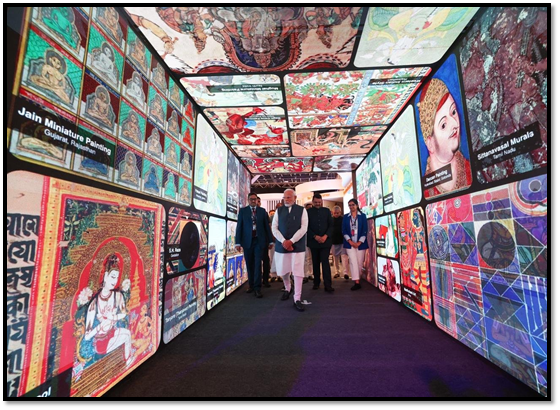India’s cultural renaissance over the last eleven years has been guided by a vision that seeks to uphold the nation’s deep-rooted heritage while embracing the modern world. Under Prime Minister Narendra Modi’s leadership, this revival has blended spirituality, infrastructure, and inclusivity—bringing India’s timeless traditions into global focus. Culture has become a key pillar of national identity and international diplomacy. From restoring temples to reclaiming artefacts, from celebrating diversity to promoting Yoga and Ayurveda worldwide, India is reaffirming its civilizational strength with pride and purpose.
Reimagining sacred spaces
India’s spiritual heartlands have been transformed through landmark projects like the Kashi Vishwanath Corridor in Varanasi, the Mahakaal Lok in Ujjain, and the construction of the Ram Mandir in Ayodhya. Pilgrimage destinations such as Kedarnath and Somnath have undergone extensive restoration and beautification, preserving their sanctity while improving the experience for millions of devotees.
Improving access to pilgrimage sites
Recognizing the need to make spiritual journeys safer and easier, the government has significantly upgraded pilgrimage infrastructure. Projects like the Char Dham Highway and the Hemkund Sahib Ropeway are improving access to remote religious sites. Meanwhile, development of the Buddhist Circuit across several states has revived interest in India’s Buddhist legacy.
Preserving diversity through inclusive development
Cultural preservation efforts have not been limited to a single faith. Through schemes like PRASHAD and Swadesh Darshan, the government has rejuvenated religious sites across faiths, fostering communal harmony. From mosques to churches to ancient shrines, investments in spiritual infrastructure have revitalized local economies and enriched India’s pluralistic fabric.
Reviving lost heritage
Reclaiming stolen antiquities has been a key part of restoring national pride. Since 2014, hundreds of artefacts once lost abroad have been traced and brought back. The United States alone has returned over 570 pieces—more than any other country—symbolizing a major diplomatic and cultural achievement.
Celebrating true nation builders
Efforts to honour freedom fighters, reformers, and unsung heroes have gained momentum through initiatives like the Azadi Ka Amrit Mahotsav. This nationwide campaign celebrated 75 years of India’s independence and spotlighted diverse contributors to the nation’s journey. Museums and memorials now serve as living tributes to their legacy.
Monuments of national pride
The Pradhan Mantri Sangrahalaya, the National War Memorial, and the Bharat Mandapam are among several major projects that reflect India’s reverence for its leaders and defenders. The new Parliament House, inaugurated in 2023, seamlessly merges traditional design with modern sustainability, serving as a powerful symbol of democratic strength.
Strengthening civilizational unity
Initiatives like the Kashi Tamil Sangamam have deepened cultural ties between regions, while the celebration of spiritual leaders across faiths has promoted mutual respect. Events like the Maha Kumbh 2025, attended by over 66 crore devotees, showcased India’s unparalleled spiritual vibrancy and its ability to unite people across backgrounds.
Embracing transparency and reform
The passage of the Waqf (Amendment) Act, 2025 has improved governance over religious assets, ensuring accountability through digitization and public access. This reform reinforces the broader commitment to modernizing systems without compromising cultural integrity.
Showcasing India to the world
The World Audio Visual Entertainment Summit (WAVES), held in Mumbai in 2025, marked a turning point for India’s media and entertainment sector. With participation from over 100 countries, the summit positioned India as a global hub for cultural exchange, business innovation, and storytelling.
Yoga as a global wellness movement
Since its international recognition in 2015, Yoga has united the world through its message of physical and mental harmony. Participation in the International Day of Yoga has grown year after year, and the 2025 theme—“Yoga for One Earth, One Health”—emphasizes wellness as a universal goal.
Ayurveda’s global reach
Ayurveda has become a global symbol of holistic health, with the Ministry of AYUSH driving international collaborations, research, and education. Agreements with countries like Vietnam and Malaysia, the launch of the Ayush Visa, and the establishment of the WHO Global Traditional Medicine Centre in Jamnagar have extended Ayurveda’s global footprint.
World recognition through UNESCO
India continues to secure global recognition for its heritage. The addition of the Moidams of Assam to the World Heritage List in 2024 took the country’s total to 43 listed sites. These places now serve not only as tourist attractions but as symbols of India’s living history.
India’s cultural resurgence is as much about remembrance as it is about renewal. Temples restored, infrastructure modernized, heroes celebrated, and traditions globalized—these achievements are rooted in a vision that sees culture not just as history, but as a force for national unity and global influence. Today, India stands tall, not only protecting its legacy but proudly sharing it with the world.














